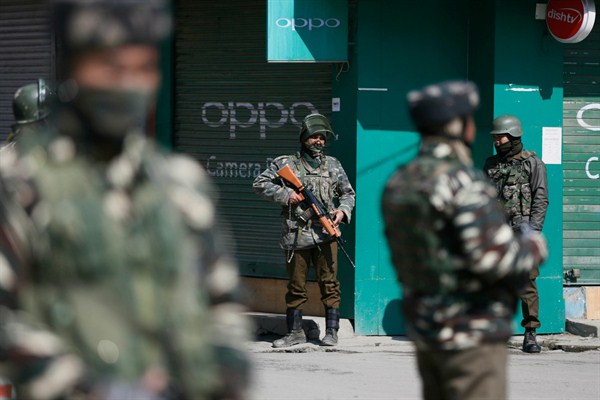It is far from the first flare-up between India and Pakistan in recent years along the Line of Control, the de facto border in the disputed territory of Jammu and Kashmir. But the still-unfolding crisis there, which was sparked by a suicide bombing last month that killed 40 Indian soldiers in the Indian-controlled part of Kashmir, points to troubling new trend lines in how future conflicts could unfold between these nuclear-armed neighbors.
Every recent crisis—from the Kargil War in 1999 and the so-called Twin Peaks incident in 2001 to the 2008 terrorist attacks in Mumbai and India’s 2016 “surgical strikes” on Pakistan—began with a provocation emanating from the Pakistani side that was, to varying degrees, attributable to its government or military. In the latest standoff, the Pakistan-based terrorist organization Jaish-e-Mohammed claimed responsibility for the car bombing in Kashmir; its leader allegedly ordered the attack from a Pakistani army military hospital where he is receiving palliative care. In the aftermath of such provocations, Indian leaders have always faced difficult choices about how to respond without triggering a dangerous military escalation that could ultimately result in the use of nuclear weapons.
This time, there was considerable, though not unusual, saber-rattling from Indian officials. Transport Minister Nitin Gadkari threatened that India would stop the flow of river water allocated to Pakistan under the Indus Water Treaty, diverting it for domestic use instead. Prime Minister Narendra Modi vowed at a rally that “every tear that has been shed will be avenged” and that the Indian military would have “full freedom to decide the place, time, intensity and nature of the retaliation against the enemy.” What was different about this episode was Modi’s deference to the military, which may set a new precedent in which India’s military leadership, rather than civilian leaders, calls the shots during future crises—something that has long been true on the Pakistani side.

